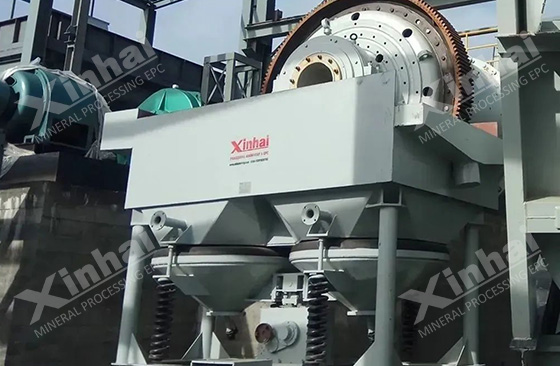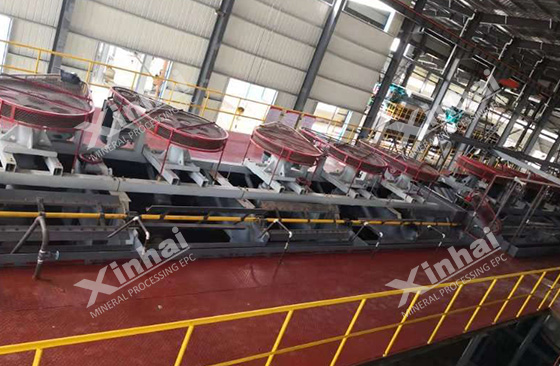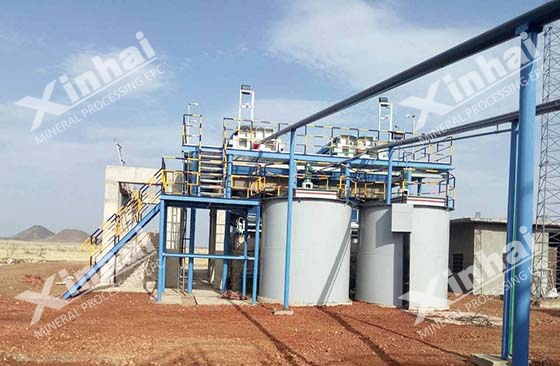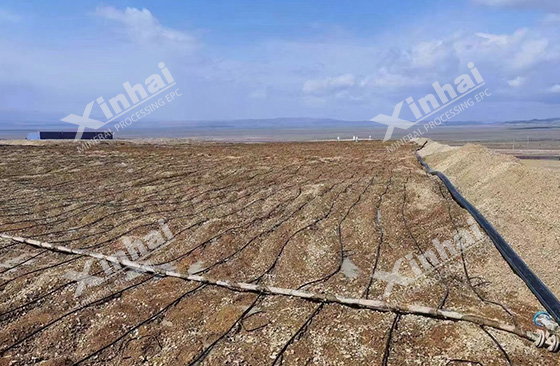
There are many types of gold mines in nature. Considering the actual situation of mineral processing, gold mines can be divided into sulfide-poor gold mines, polysulfide gold mines, gold-bearing polymetallic ores, gold-bearing copper ores, etc. Depending on the type of ore, the treatment methods used by the concentrator are also different. For example, flake, leaf and plate gold are mostly recovered by flotation or cyanidation, and gravity separation or mercury amalgamation are used to recover the above categories. The effect of gold is not good, and then the effect of recycling granular or spherical gold is good. Therefore, in actual production, one or a combination of technologies such as gravity separation, mercury amalgamation, flotation, and cyanide should be selected for gold ore separation based on the characteristics of various types of gold ores. The following will introduce you to the gold mines separation technology based on the above-mentioned technologies.

As one of the main beneficiation technologies for gold mines, gravity separation has the advantages of no pollution, low production cost, and wide application range. The density of gold is generally greater than 16t/m³, which is quite different from the density of gangue minerals. Therefore, gold particles and gangue mineral particles can be separated by gravity separation. The gravity separation method is generally performed in a fluid medium. Gravity separation is often used in the treatment of placer gold ores, and when dealing with rock gold ores, gravity separation is generally used as an auxiliary technology for subsequent separation. It is mainly used to recover coarse-grained gold in the grinding circuit, and at the same time, it is used for subsequent flotation and cyanide separation. The chemical process provides favorable conditions, improves the overall mineral processing index, and increases the recovery rate of gold concentrate. The gravity separation process does not require the consumption of chemicals, the process and equipment are simple, and it is suitable for processing coarse and medium-grained ores. Common gold gravity separation equipment includes chutes, jigs and shakers.
Mercury amalgamation technology is an older gold mines extraction technology with a simple process and low cost. It is mainly used for the recovery of coarse single gold particles. The principle of gold extraction by mercury amalgamation is based on the selective wetting of gold particles in liquid metal mercury-enriched slurry, thereby separating the gold particles from other gangue minerals and metallic minerals, and then the diffusion surface of the wetted gold particles forms an alloy with mercury , the alloy formed enters the steamed mercury to separate the mercury to obtain gold. There are many factors that affect the extraction of gold by mixing mercury, among which the surface energy of the gold-water interface and the surface energy of the mercury-water interface are the main factors. In addition, gold particle size, degree of dissociation, gold particle color, slurry temperature, concentration, etc. will also affect the gold ore extraction efficiency.

Most rock gold mines use flotation to recover gold. Flotation is mainly used to treat sulfide gold-bearing ores with high floatability. Gold is a sulfur-loving element that often coexists with metal sulfide minerals. Gold itself is not chemically active and generally exists in the form of monomeric particles in nature. As a floating mineral, natural gold has low surface wettability. Its floatability is good.
The flotation process of gold mines uses xanthate and black powder as collectors, and lime, cyanide and sodium sulfide are used as gold inhibitors. The factors that affect the gold extraction efficiency during the flotation process mainly include the size of the gold particles, the shape of the gold particles, the purity of the surface of the gold particles, and the types and contents of impurities in natural gold. Flotation method generally can only enrich gold into various sulfide concentrates. Therefore, a single flotation process cannot obtain finished gold. Generally, it is necessary to combine other technologies for gold recovery.
Cyanide gold extraction technology mainly includes cyanide leaching, washing and filtration, gold extraction and finished product smelting. According to the different materials processed, the cyanide gold extraction process can be divided into two types: one is the cyanidation process that processes flotation gold concentrate or mercury amalgamation and gravity separation tailings, and the other is the whole mud process that processes muddy oxidized ores. Stirred cyanidation process. The leaching rate of gold extracted by cyanide is related to many factors, such as cyanide concentration, oxygen concentration, slurry pH value, slurry temperature, gold mineral raw material composition, gold particle size, sludge content, slurry concentration and leaching time, etc. Adding auxiliary oxidant, adding leaching agent or wetting agent and heating and pressurizing oxidation leaching can shorten the leaching time, further increase the leaching rate, reduce cyanide consumption, and strengthen the gold extraction effect of cyanide.

This method is a process in which monovalent gold cyanide is adsorbed with carbon after cyanide leaching. It is used to treat gold-containing oxidized ores with high sludge content. The equipment used in the process mainly includes carbon adsorption tank and activated carbon.
The mined ore is transported to a pre-prepared stockyard for pile building, or is piled directly on waste rock or low-grade ore piles, and then the cyanide leachate is sprayed or percolated. The solution will percolate in the ore pile, and the cyanide leachate will be repeatedly sprayed into the ore pile for many times. The collected leachate will then be processed using activated carbon adsorption or metal zinc replacement.

The above are several gold mines beneficiation technologies. In actual production, beneficiation plants generally need to use joint beneficiation methods to recover gold. Therefore, it is recommended to conduct beneficiation tests to determine the characteristics and properties of gold ore, and customize a beneficiation plan to improve the quality of gold resources utilization and gold mines recovery rates.
To find out more about our products and solutions, please fill out the form below and one of our experts will get back to you shortly.